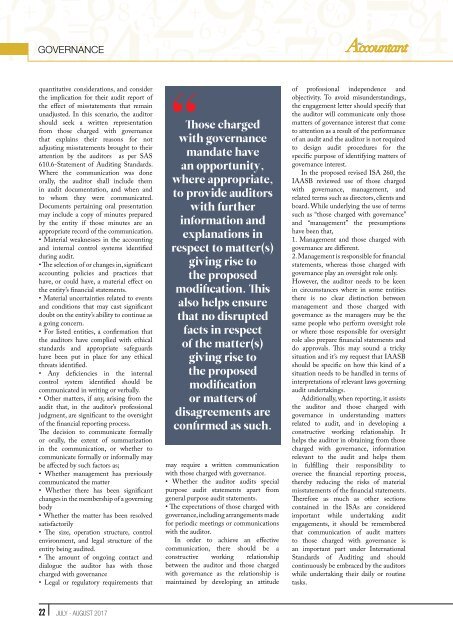The-Accountant-Jul-Aug-2017
You also want an ePaper? Increase the reach of your titles
YUMPU automatically turns print PDFs into web optimized ePapers that Google loves.
Governance<br />
quantitative considerations, and consider<br />
the implication for their audit report of<br />
the effect of misstatements that remain<br />
unadjusted. In this scenario, the auditor<br />
should seek a written representation<br />
from those charged with governance<br />
that explains their reasons for not<br />
adjusting misstatements brought to their<br />
attention by the auditors as per SAS<br />
610.6-Statement of Auditing Standards.<br />
Where the communication was done<br />
orally, the auditor shall include them<br />
in audit documentation, and when and<br />
to whom they were communicated.<br />
Documents pertaining oral presentation<br />
may include a copy of minutes prepared<br />
by the entity if those minutes are an<br />
appropriate record of the communication.<br />
• Material weaknesses in the accounting<br />
and internal control systems identified<br />
during audit.<br />
• <strong>The</strong> selection of or changes in, significant<br />
accounting policies and practices that<br />
have, or could have, a material effect on<br />
the entity’s financial statements.<br />
• Material uncertainties related to events<br />
and conditions that may cast significant<br />
doubt on the entity’s ability to continue as<br />
a going concern.<br />
• For listed entities, a confirmation that<br />
the auditors have complied with ethical<br />
standards and appropriate safeguards<br />
have been put in place for any ethical<br />
threats identified.<br />
• Any deficiencies in the internal<br />
control system identified should be<br />
communicated in writing or verbally.<br />
• Other matters, if any, arising from the<br />
audit that, in the auditor’s professional<br />
judgment, are significant to the oversight<br />
of the financial reporting process.<br />
<strong>The</strong> decision to communicate formally<br />
or orally, the extent of summarization<br />
in the communication, or whether to<br />
communicate formally or informally may<br />
be affected by such factors as;<br />
• Whether management has previously<br />
communicated the matter<br />
• Whether there has been significant<br />
changes in the membership of a governing<br />
body<br />
• Whether the matter has been resolved<br />
satisfactorily<br />
• <strong>The</strong> size, operation structure, control<br />
environment, and legal structure of the<br />
entity being audited.<br />
• <strong>The</strong> amount of ongoing contact and<br />
dialogue the auditor has with those<br />
charged with governance<br />
• Legal or regulatory requirements that<br />
Those charged<br />
with governance<br />
mandate have<br />
an opportunity,<br />
where appropriate,<br />
to provide auditors<br />
with further<br />
information and<br />
explanations in<br />
respect to matter(s)<br />
giving rise to<br />
the proposed<br />
modification. This<br />
also helps ensure<br />
that no disrupted<br />
facts in respect<br />
of the matter(s)<br />
giving rise to<br />
the proposed<br />
modification<br />
or matters of<br />
disagreements are<br />
confirmed as such.<br />
may require a written communication<br />
with those charged with governance.<br />
• Whether the auditor audits special<br />
purpose audit statements apart from<br />
general purpose audit statements.<br />
• <strong>The</strong> expectations of those charged with<br />
governance, including arrangements made<br />
for periodic meetings or communications<br />
with the auditor.<br />
In order to achieve an effective<br />
communication, there should be a<br />
constructive working relationship<br />
between the auditor and those charged<br />
with governance as the relationship is<br />
maintained by developing an attitude<br />
of professional independence and<br />
objectivity. To avoid misunderstandings,<br />
the engagement letter should specify that<br />
the auditor will communicate only those<br />
matters of governance interest that come<br />
to attention as a result of the performance<br />
of an audit and the auditor is not required<br />
to design audit procedures for the<br />
specific purpose of identifying matters of<br />
governance interest.<br />
In the proposed revised ISA 260, the<br />
IAASB reviewed use of those charged<br />
with governance, management, and<br />
related terms such as directors, clients and<br />
board. While underlying the use of terms<br />
such as ‘‘those charged with governance’’<br />
and ‘‘management’’ the presumptions<br />
have been that,<br />
1. Management and those charged with<br />
governance are different.<br />
2. Management is responsible for financial<br />
statements, whereas those charged with<br />
governance play an oversight role only.<br />
However, the auditor needs to be keen<br />
in circumstances where in some entities<br />
there is no clear distinction between<br />
management and those charged with<br />
governance as the managers may be the<br />
same people who perform oversight role<br />
or where those responsible for oversight<br />
role also prepare financial statements and<br />
do approvals. This may sound a tricky<br />
situation and it’s my request that IAASB<br />
should be specific on how this kind of a<br />
situation needs to be handled in terms of<br />
interpretations of relevant laws governing<br />
audit undertakings.<br />
Additionally, when reporting, it assists<br />
the auditor and those charged with<br />
governance in understanding matters<br />
related to audit, and in developing a<br />
constructive working relationship. It<br />
helps the auditor in obtaining from those<br />
charged with governance, information<br />
relevant to the audit and helps them<br />
in fulfilling their responsibility to<br />
oversee the financial reporting process,<br />
thereby reducing the risks of material<br />
misstatements of the financial statements.<br />
<strong>The</strong>refore as much as other sections<br />
contained in the ISAs are considered<br />
important while undertaking audit<br />
engagements, it should be remembered<br />
that communication of audit matters<br />
to those charged with governance is<br />
an important part under International<br />
Standards of Auditing and should<br />
continuously be embraced by the auditors<br />
while undertaking their daily or routine<br />
tasks.<br />
22 JULY - AUGUST <strong>2017</strong>

















